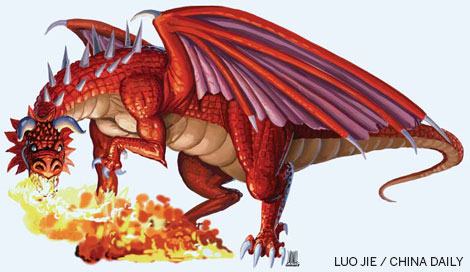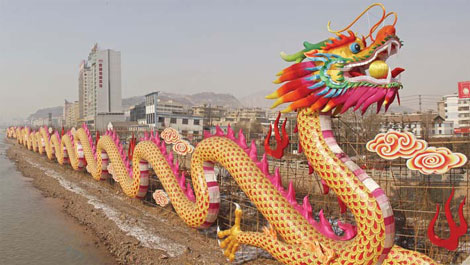A beast of benevolence
Updated: 2012-01-06 08:01
By Chen Yingqun (China Daily)
|
|||||||||||
|
|
The dragon, a reviled baddie in the West, is revered in China. It even gets to have a year named after it.
They know it as a fire-breathing, malevolent creature, with a lizard-like form used to depict the devil himself. So many in the West may continue to be surprised at how the dragon is revered as a symbol of power and majesty at the top of the animal order in Chinese thought. The mythical Chinese dragon or long is so important that the year it lends its name to, such as 2012, is widely considered to be one of the most auspicious in the 12-year cycle of the Chinese zodiac. The differences in cultural perceptions of the legendary beast are so complex that many say they still serve to illustrate some of the biggest gaps that still exist between the East and West.

"To me, dragons are like big reptiles with razor-sharp teeth and rough skin. They are fierce, fire-breathing creatures," says Aleksandra Kawakawa, 23, from Poland.
"Dragons are something out of medieval times, with castles and moats and knights. They are monsters that terrorized the Earth, out of fairy tales," says Wendy Fung, a 24-year-old from the United States.
The dragon's character has been the focus of a fiery debate in China in the past week. China Post issued a stamp to mark the new year, which falls on Jan 23 this year, and on it is depicted a dragon that many say simply looks too ferocious.
Chinese scholars argue that the Western name used for the Chinese long alone is problematic. Long has been translated into "dragon" for a long time, but Guan Shijie, a professor at Peking University who studies inter-cultural communication, says that is wrong. "The Chinese long and the Western dragon are different in image, denotation and connotation. We should find other words to translate them."
Guan says the long should instead be known as "loong", after the famous kungfu star Bruce Lee's native name Lee Siu Loong.
The Chinese worship of dragons goes back to ancient times. With limited knowledge of nature and often helpless against a harsh and changing environment, many clans and tribes saw dragons as a powerful totem that granted supernatural powers protecting them from harm and providing them with luck, says Wang Daliang, a professor at China Youth University for Political Sciences in Beijing and a researcher on Chinese folklore.
"Initially, the Chinese dragon's appearance also varied from region to region, as they were based on animals that people encountered," says Gao Wei, secretary general of the Beijing Folklore Society.
The dragon could look like a horse, a cow, a snake or even a fish, Gao says.
The image of the Chinese dragon was not fixed until the Song Dynasty (960-1279), when famed artist Guo Ruoxu produced a detailed depiction of the animal in his seminal book The Record of Illustration and Traditional Chinese Painting.
"In Guo's mind, the dragon is a combination of nine different creatures. It has a deer's horns, horse's head, turtle's eyes, snake's neck, fish scales, hawk talons, cow ears, tiger paws and a sea serpent's abdomen," Gao says.
The long was also believed to possess a wide range of powers and abilities. It could speed across the skies and probe deep underground. It controlled nature, especially the crucial resources of water and rain that were indispensable to an agrarian society. Ordinary Chinese came up with ever more ways to show their affection and admiration for the sacred long. In areas prone to floods and other natural disasters, dragon temples were built to pray for good harvests and adequate rain.
Chinese people continued to imbue dragons with their imagination and made them ever more mighty, divine and benevolent.
"They are as wild as the beasts of the Earth, as intelligent as humans - and as sacred as the gods," Gao says.
In Chinese folklore, long is also a fearless fighter and can see into the future. Righteous and sometimes standing on the side of the people, it symbolizes fertility, beauty, longevity and all the hopes of the people, Gao says.
Perhaps most obviously to Western visitors to China, the long is the symbol of the power of Chinese emperors. In feudal societies, the emperors considered themselves as "the real dragon and the son of heaven", and everything they used, from beds to robes, were labeled as belonging to these.
Dragon motifs were widely used as decorations for palace objects. The dragon's color, yellow, was reserved for the supreme ruler of the land. From the Song Dynasty, only emperors could use dragon patterns, Gao says.
It became taboo for commoners to use the creatures or even draw pictures of them. That also meant that some rebels would deliberately take up dragon symbols to topple unpopular monarchs.
Many proverbs closely related to the dragon are still widely used. A typical one is wangzichenglong (), which illustrates Chinese parents' wishes for their children to be "as perfect as the long".
Beloved Chinese foods have also been named after the dragon, including longyan (longan, after the dragon's eyes) and longxumian (or "dragon whisker" noodles).
Popularity for the Chinese dragon, which appears as the fifth sign in the zodiac, hits fever pitch during the Chinese Year of the Dragon - which falls in 2012.
To help usher in the new year, people across China are expected to hold dragon dances on the night of the 15th day of the first month in the Chinese lunar calendar. Crowds will throng performances where frenzied dancers will hold up elaborate dragon floats lit by lights.
"Dragon dances are a fantastic spectacle and people believe it will bring light and hope to their lives," Gao says.
Boat races during the Dragon Festival, which usually falls on the fifth day of the fifth lunar month, are also expected to be especially regal during the Year of the Dragon.
Zhan Qi, 26, is expecting her first child this year. "I'm so excited to have my baby born in the Year of the Dragon," she says. "People born in this year are said to have a lot of charisma, wisdom and longevity."
Today's Top News
Rescuers race against time for quake victims
Telecom workers restore links
Coal mine blast kills 18 in Jilin
Intl scholarship puts China on the map
More bird flu patients discharged
Gold loses sheen, but still a safe bet
US 'turns blind eye to human rights'
Telecom workers restore links
Hot Topics
Lunar probe , China growth forecasts, Emission rules get tougher, China seen through 'colored lens', International board,
Editor's Picks

|

|

|

|

|

|






